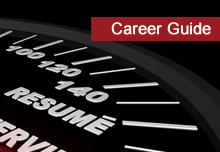Interview Problems
Not getting interviews?
If you have been applying for jobs for which you meet the minimum criteria, but you haven’t been invited to an interview, it is probably time to take a critical look at your CV or application forms. Make an appointment to see your careers adviser. Take copies of your CV with you and any application forms you have submitted, and explain that you have not been successful in getting invited to the interview stage.
Are you demonstrating in your applications that you know what the company does, what its products are, what the job function you are applying for actually entails and what specific skills and qualities the company is looking for? Are you making the most of your unique experiences and achievements? You cannot afford to undersell yourself at the application stage, as the information you provide is all the employer has to go on when making a decision about who to shortlist for interview.
Remember that speculative applications - that is, sending your CV to companies to ask if they may have a position suitable for you rather than responding to specific advertisements - may be successful but are usually less productive than applying for specific vacancies.
If you are applying for graduate training schemes in areas that attract lots of applicants, such as HR or advertising, but have a very small annual intake (even big companies abroad may only take four graduates a year), it may be worth considering other routes into the industry, such as a junior or assistant-level position, to gain experience.
Getting to interviews and assessment centres, but not getting offers?
Stay positive! Remember that if you are not successful in progressing to another round of selection, or in being offered a job, this may have nothing to do with your performance or answers at interview or an assessment centre. It may simply reflect that you are not what a particular organisation is looking for. It should be possible to get some feedback from the organisation to clarify the reasons for their decision. Discuss any feedback you receive with your careers adviser to see whether there is anything you can learn or build on for the future.
After interviews and assessment centres, it is important to review how things went and to learn from the experience for the next occasion. You could prepare some notes on how you think you performed, asking yourself questions such as:
- Was I as prepared as I could have been for the interview or assessment centre?
- Did I remain interested, enthusiastic and positive?
- Did I focus sufficiently on my personal skills, strengths and abilities?
- Was I able to relate my previous experience to the position for which I was being interviewed or assessed?
- Did I avoid generalities and provide specific examples?
- Did I downgrade anything by using ‘only’ in my examples? 'Yes, I’ve worked as part of a team, but it was only a bar job during my vacation.’
- Was I able to show the interviewers how motivated I am, and how much I wanted that job?
- Did I demonstrate a good knowledge of the organisation and the position?
- Which elements of the assessment centre did I do well on, and which did not go so well?
Thinking about these things can help you to evaluate your performance and improve on it. These questions can also serve as useful prompts in future interview and assessment centre preparation.





